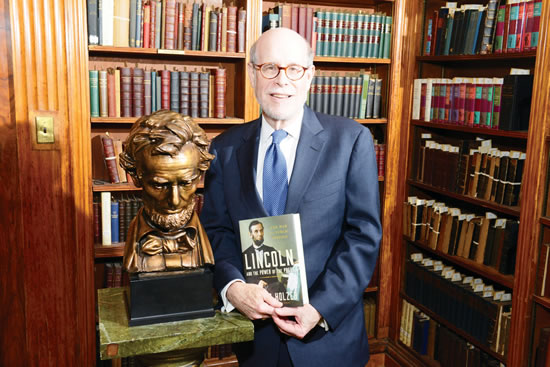U.S. Civil War Historian Harold Holzer Fêted at Cooper Union
By Sybil Maimin

Harold Holzer
Harold Holzer, renown authority on Abraham Lincoln and the Civil War era, was recently awarded the 2017 Empire State Archives & History Award before an audience of friends, colleagues, family, students, admirers, and celebrities at The Great Hall of The Cooper Union. The Great Hall was a particularly appropriate location for the presentation as it was here that Lincoln gave the historic speech against the expansion of slavery that launched his bid for the Presidency. On stage, site of the “Lincoln Podium,” a relaxed and upbeat Holzer engaged in a delightful conversation with Tony Award Nominated Actor and friend, Stephen Lang. The two men clearly enjoyed the exchange, as did the audience. The Jonathan F. Fanton Director of The Roosevelt House Public Policy Institute at Hunter College since 2015, Holzer has had a long and interesting career that took him to the front lines of the political and cultural worlds. He discovered his interest in the Civil War while a student at Queens College. Despite discouragement from his professor about entering the Civil War field and parents who had ideas different from his about “success,” Holzer considered a career in journalism, the museum world, the theater, or politics. Early on, together with his wife, Edith, he wrote for and became editor of a neighborhood news weekly, “Manhattan Tribune,” that covered the Upper West Side and Harlem. The paper ultimately folded, but he remembers it fondly, quoting his editor, “This is the best job you’ll ever have.” As a young man, he tried the world of politics, working in the NYC mayoralty campaign of Mario Cuomo and the U.S. Senate and NYC mayoralty campaigns of Bella Abzug. Not interested in running for public office himself (“I’m not good with people . . . I lost five elections for people”), he channeled his interest in public affairs into the candidates he supported. He cites Abzug and Cuomo (as well as his father) as his heroes. Abzug was “extraordinary,” he exclaimed. “She was there the moment we needed her on women’s rights. She paved the way for other women. When she ran for the Senate, there were no women senators.” Holzer extolls Cuomo as “the most articulate person I ever heard,” happily stating, “I got to work on a book with him.” Holzer also served as Director of Public Information for WNET/Channel 13, and for 23 years as senior vice president for public affairs at The Metropolitan Museum of Art. When questioned by Lang about the length of his stint at The Met, Holzer explained, “I worked for director Philippe de Montebello. I worked for the best museum in the world, one that did everything better than any other institution in the world.” He left the museum to write books, but could not resist the offer for his current position at Hunter College’s Roosevelt House. “I wanted the job,” he says.
At heart, a historian and Lincoln scholar, Holzer was chairman of the Abraham Lincoln Bicentennial Foundation for six years and co-chair of the U.S. Lincoln Bicentennial Commission for 10 years. He has authored, co-authored, or edited 52 books on Lincoln and 550 articles for magazines and journals. His books, including “Lincoln at Cooper Union: The Speech That Made Abraham Lincoln President,” “Lincoln and the Power of the Press: The War for Public Opinion,” and “The Civil War in Fifty Objects,” have won many awards. He is currently writing a “very timely” book on Lincoln and immigration. He notes, “Lincoln’s record on this is not perfect. He flirted with Nativists for political reasons, but changed. . . I’m very happy to be doing it.”
Cooper Union’s Great Hall was founded in 1859 as a place for public discourse on important issues of the day, an “experiment in practical democracy.” It’s where abolitionist Frederick Douglass defended Lincoln’s Emancipation Proclamation, suffragette Elizabeth Cady Stanton called for women’s right to vote, Oglala Tribe Chief Red Cloud defended the rights of Native Americans, and the NAACP held its first meeting. More recently, presidents Bill Clinton and Barack Obama have spoken from the “Lincoln Podium.” The New York State Archives, administered by the State Education Department, collects, preserves, and holds 200 million documents that record the history of the state from colonial times until the present. It has been open to the public since 1978. #
